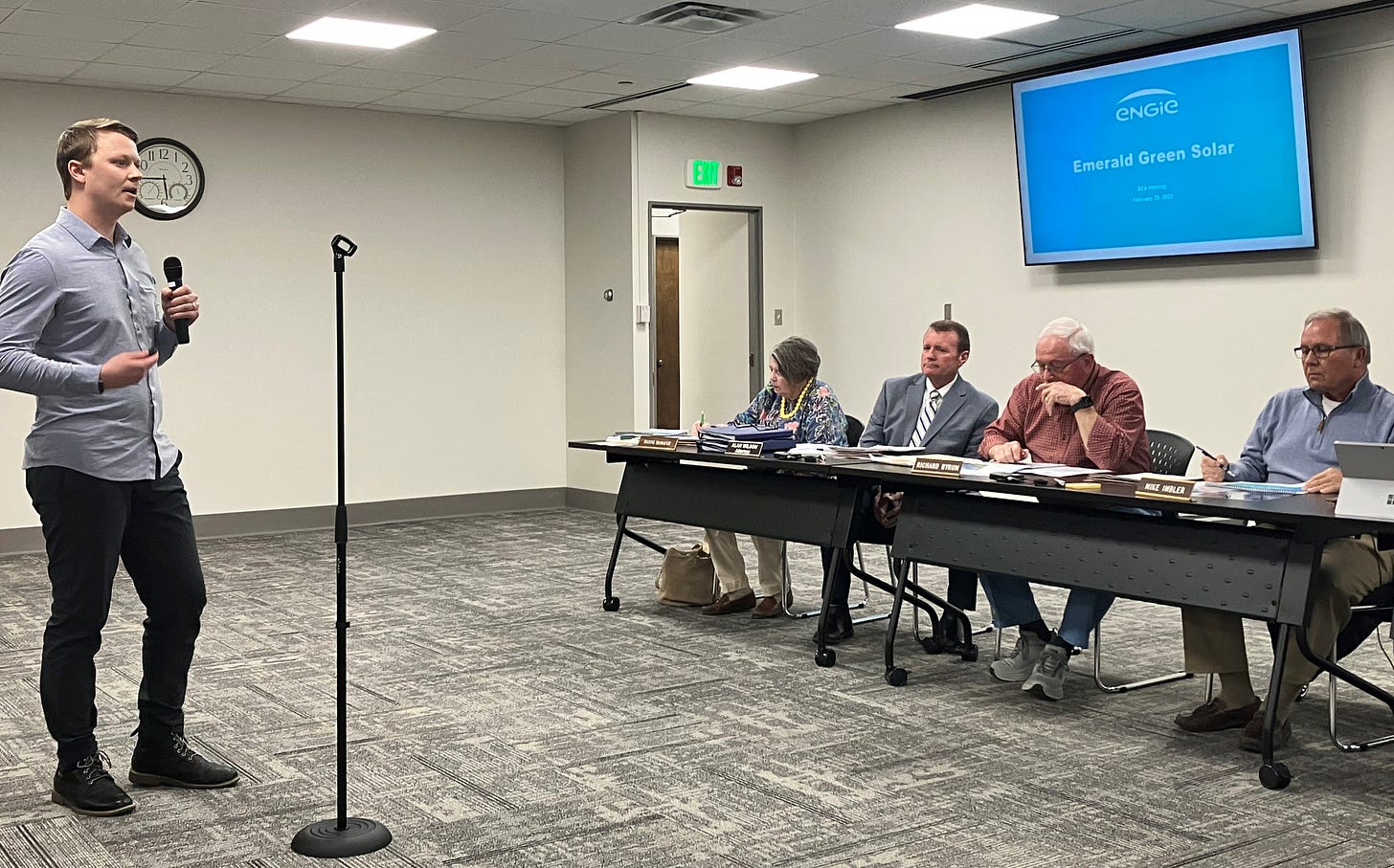Solar project gets Emerald Green light
Remonstrators have 30 days to challenge zoning board’s decision
A 1,300-acre solar farm proposed for eastern Howard County cleared its first administrative hurdle on Feb. 28. Emerald Green Solar LLC, a subsidiary of French energy producer ENGIE, was granted a special exception by the Howard County Board of Zoning Appeals to allow the farm to be constructed.
The approval reverses two prior decisions by the board to deny the zoning exception.

An overflow crowd of more than 150 citizens supporting and opposing the project were in attendance at the hearing, and the remonstrators brought legal counsel to assist in their argument against the solar farm. But their efforts were not enough to sway the board, which saw a change in membership in January. The two new members of the five-person board, Russell Hopkins and Greg Tipton, voted with returning member Michael Schroeder to approve the special exception.
Board members Richard Byrum and Mike Imbler voted against the measure as they had done in earlier hearings for the solar farm.
The remonstrators’ attorney, Jason Kuchmay of Fort Wayne, led the opposition’s argument, warning that a vote in favor of the project would constitute an “arbitrary and capricious” decision that could be challenged and reversed in court.
“This is a request for a special exception,” said Kuchmay. “Commercial solar is not a permitted use in Howard County and with good reason. There are many potential effects: negative impacts on property tax values, health concerns, environmental concerns, fire safety concerns, flooding concerns, the removal of productive farmland operation.
“When you denied Emerald Green’s prior requests, this board found that the solar project will be injurious to the public’s health, safety, and general welfare. This board found that the project will result in a decrease in property values of the surrounding properties. The board found that the setbacks proposed are insufficient.
“This board found that the surrounding properties’ uses may be permanently injured. And this board found that the solar project is inconsistent with the intended ag uses of the property and the spirit and intent of the ordinance. Nothing you heard tonight changes any of those findings. In fact, most of those findings were not even addressed.”

Tom Schoder, project development specialist for ENGIE, gave the company’s presentation to the board and spent 30 minutes describing how the company felt it had met the requirements of the county’s solar ordinance. He highlighted the several sections of the ordinance and how the company chose to comply, including things like a decommissioning plan with a surety bond valued at 125 percent of the cost to remove the solar panels at the end of their useful life and a setback from surrounding properties three times farther than the 100 feet required by the law.
Schoder further explained that the company intended to plant pollinator vegetation in between the panels to foster nutrient recovery on the affected land. He pledged that there would be no clear-cutting of forested land and no removal of topsoil. Any alteration of the land would involve “scratch grading” to level out any hills or low spots. Also, no areas of the proposed solar farm would be paved over, he claimed.
“We are very excited for the opportunity to become part of the clean energy economy here in Howard County,” said Schoder. “We are thrilled to be part of your long-term growth and prosperity.
“By letting this land rest, we are allowing it to regain its nutrients. And solar projects are temporary. Once it reaches the end of its useful life, it will be properly decommissioned and can go back to active agriculture at that time.”
The solar farm is a projected $225 million investment that should generate $55 million in tax revenue over the life of the project. It would require no investment from local government and would generate approximately 200 megawatts of electricity annually; enough to power 30,000 homes.
With the special exception granted, the solar project next heads to the Howard County Plan Commission. And Emerald Green will need to negotiate with Howard County on several items, such as drainage and a stormwater plan, an economic development agreement, road use and improvements, and a detailed decommissioning process.
Further, those wishing to challenge the board’s decision have 30 days to make their appeal. Passage of the special exception does not allow construction to begin on the project.
Remote participation
Prior to the hearing, the board considered a new policy allowing members to attend the meeting and vote remotely. County attorney Alan Wilson submitted the policy, explaining that state law allows for such an arrangement.
“Under Indiana law, we can have a member participate electronically,” said Wilson. “But we have to have a written policy in place to allow that. This is part of the Open Door law which allows it. It started during COVID when folks either couldn’t meet or didn’t want to meet in person. The legislature has allowed governmental agencies like this to participate remotely.
“The policy, at base, says the person has to be able to hear and see and has to be able to be seen and heard in order to vote. The vote has to be taken on a roll-call basis. If the person can participate simultaneously with the rest of the board, they can vote.”
Under the new policy, no member may participate in more than two consecutive meetings remotely. And at least 50 percent of board members must be present in person before any member is allowed to participate remotely. The City of Kokomo currently allows such participation on its boards, Wilson said.
Despite some opposition from the audience, board chairman Imbler moved to accept the policy, and the board voted unanimously in favor of the change. This allowed board member Tipton to participate and vote at the meeting via video.




